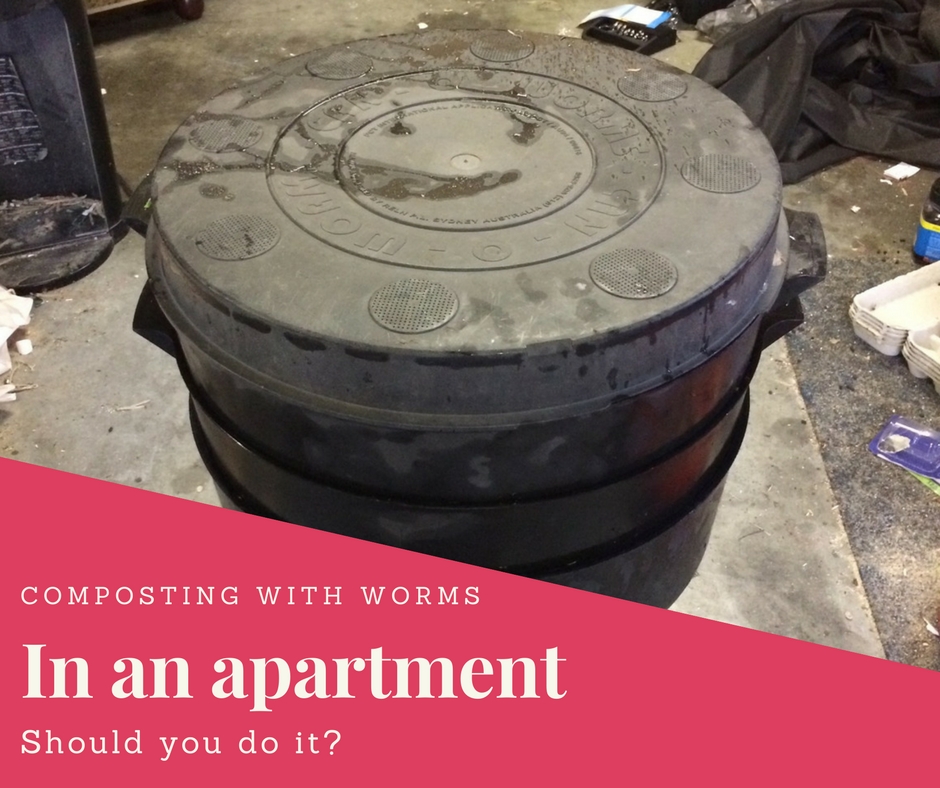Composting with worms in an apartment, should you do it?
View this post on Hive: Composting with worms in an apartment, should you do it?
Composting with worms in an apartment
So you had that crazy idea of wanting to start composting food with worms instead of throwing them away into landfills and you want to do it indoors in a small apartment? And you don’t even have any plant to apply the resulting worm compost to? Is that even possible?
Vermicomposting indoor in an apartment
By nature, worms prefer shady areas as they are photophobic (scared of light). Even though they don’t have eyes, they have special cells on their skin that can sense light. It is probably a self-defense mechanism against being burnt/dried by sunlight. We know that worms need their skin to be constantly moist because they breathe through their skin and moisture allows a better gas exchange, so an extended exposure to sunlight will be fatal as it will start to dry their skin and the UV will worsen things. So keeping them indoor should not be an issue. But things are never as easy as they seem to be and keeping worms indoors have its own set of challenges:
- space is probably the first challenge, where can you install a worm bin? Most common places are a basement or the laundry room. Some people have also installed a worm bin in the bathroom or even in their bedroom (I kid you not). Other spots like the kitchen sink cabinet can be considered although they are not ideal as we will see below. You can get increase the performance of your vermicomposting by choosing a better system such as the Urban Worm Bag or Worm Inn Mega (both of which are only available in the USA for the moment), those worm bags are made of a breathable fabric and the extra oxygen they can absorb makes them more efficient than a regular plastic tray system which retains more water than it allows air in. Alternatively, if you can obtain authorisation, you could install a larger system such as a CFT (Continuous Flow Through) in the communal area of your building but it might means you will also volunteer for its maintenance and making sure everyones follows the "rules".
- ventilation: a well-maintained worm bin should not smell foul but like nice earthy smell as when you walk in a forest. However, the composting process needs a well-ventilated system to bring more oxygen in and drain other gas off. So keeping a worm bin under the kitchen sink, although it can work, can also result in worms trying to crawl off if there is insufficient oxygen coming in the system. If you have a basement then it can be a great spot especially in terms of temperature.
- surface area is key for performance: if you want or compost more, you need, not deeper trays or more trays, but more surface area. Compost worms live on the top inches of the surface close to the food, the deeper you go down the fewer worms will be present and this is what you want because the new food is deposited on the surface. So at some point, adding more trays won’t help compost more waste. You need a larger area to host a larger bin. But if you do this for an ecologic reason, then don’t forget that you at least do something and don’t have to compost all your waste, just contribute what you can even if it is only 20%, if we can get everyone to compost even 10% of their waste, it is already a huge improvement.
- the balcony is not always a great idea: balconies are great because they are well ventilated, however, they can be located where the sun shines most part of the day and even one-hour exposure of the bin to the sun can be fatal for the worms as heat will accumulate to high levels. You would need to provide shade and make sure there is at least 10 inches gap between the shade material and the bin itself so cooled air can circulate in between.
- the garage could be an option if in the temperature in the summer is not too high or you'll cook the worms.
- you might have some unwanted guests: fruit flies, fungus gnat, ants and other bugs like rolly pollies depending on where the waste was from. This could be one of your most challenging issues but potential solutions here include a better worm bin management by avoiding overfeeding and using more bedding material (cardboard/newspaper) to use exclusively kitchen waste and never bring in material from outdoor (leaves etc...), not bringing outdoor waste. Preventing being more effective than curing, freezing the waste prior to adding them to the bin will kill eggs and prevent mass hatching of the bugs in your bin. Additionally, a worm bag with a good lid like the Urban Worm Bag can help a lot.
- moisture of the bedding is one important point to control in all worm bins but indoors it is even more important as a well aerated and just moist but not wet bedding will be more stable and you will have less chance of getting an anaerobic stinky compost. Excess moisture, being most of the time a result of overfeeding, can also lead to more critters/pests invasion attracted by the fermenting extra food waste. Reduce feedings and increase dry bedding material.
Despite challenges, people have been successfully doing vermicomposting in apartments, you just need to be strict on the maintenance and feeding techniques. I personally think that vermicomposting can be even done in a studio apartment as long as you follow the basic guidelines. The “10 biggest mistakes new Worm farmer makes” free eBook my friend Larry Shier wrote is will be invaluable if you want to learn from mistakes others make.
You don't have a garden or even plants, what to do with the vermicompost you will get from worm farming?
Living in an apartment can sometimes mean you can't have any plants or maybe you just don't want to grow any plant for any personal reasons. So why would you do vermicomposting anyway?
You wouldn't be the first person to do it. The first main reason to do worm composting is of course for an ecological reason: you want to divert some of the food waste you produce from landfills as a contribution to helping the environment. But in that case, what can be done with the compost you obtain in the end? Here are some reasons I can think of:
- give it to a friend or family member who has a garden
- give it to a local community garden
- sell it to someone for some pocket money
- throw it in the trash bin, it is still better than throwing the waste the compost was made of and it also takes less space
Ben Jammin, a member of a vermicompost group on Facebook I'm moderating, did it for years back in his college days. He does warn on the issues of fruit flies and fungus gnat saying "No matter how diligent you are it will happen. I should note that the closed-bag flow-throughs like the Worm Inn and Worm Bag offer the option of slipping a crevice nozzle (of a vacuum cleaner) into the zipper to catch hatches before opening up, which can make a HUGE difference. I noted your possibility of "group management" of a bin for an apartment complex... let me opine that I would never do that. Nyarlathothep knows what people might put in there, or spray in there if they don't like the flies."
So, should you do it? My answer is, maybe you should give it a try and see if it is something for you. There are challenges, but if you manage to overcome them then it's worth the effort.
Does that scare you? Does it challenge you to try? Have you done it before? Tell us here in the comment sections.
Credits
- The image at the top has been generated with the Canva app using my own photo.
- Thank you Ben Jammin to share your point of view
Related content
- Adding rockdust to a composting system
- What makes vermicompost a good fertilizer? A little intro to the soil food web
- Do worms really not eat meat. Understanding relative quantities
- How to feed your compost worms
- How to set up a worm bin
- How to build an aerated compost tea brewer
- Are you doing it right?
- What are the possible causes of mortality in compost worms
- What does a worm cocoon look like
- 10 myths in worm farming


You have received an upvote from @livesustainably. I promote and curate content that encourages and educates others in living sustainably. You can support the live sustainably cause on Steemit by upvoting, resteeming and creating content under the tag #livesustainably.